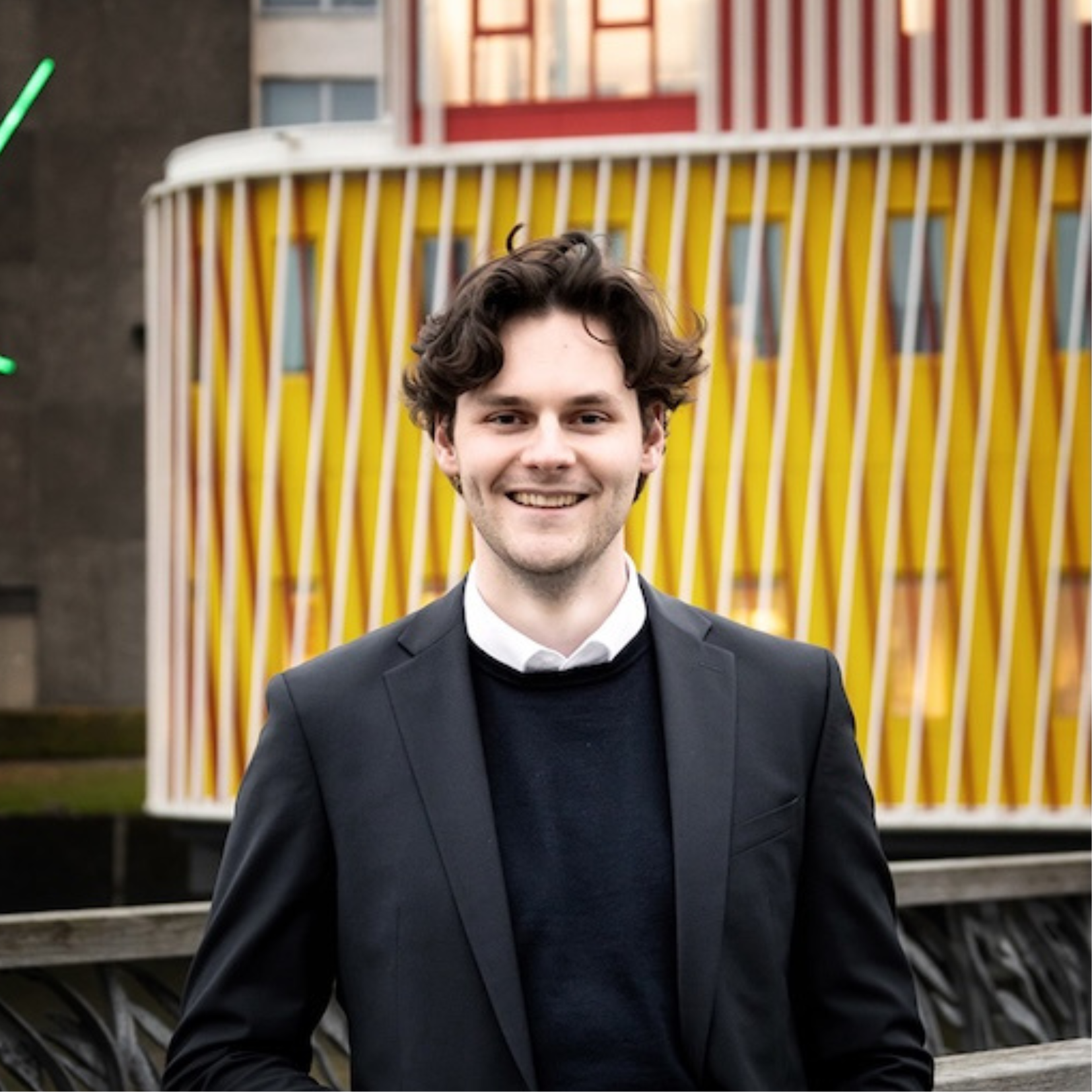
Study Supply Chain Management in Groningen and learn to analyze supply chain processes, coordinate networks of organizations, and lead in the sustainability transition.
You will start with the course SCM Fundamentals, covering the
basic knowledge and skills to analyze supply chain performance and
understand the crucial role of coordination. Later courses will
take you deeper, teaching you how to diagnose supply chain issues,
improve processes, and coordinate across networks of organizations
in global supply chains.
Throughout the year, you will be able to take a wide variety of
elective courses. Please see the course catalogue below for the
full list.
Theory comes to life when you join guest speakers, work on case studies with practical data sets, and present your project results to managers.
| Semesters | ||||
|---|---|---|---|---|
| CoursesCourse Catalog > | 1a | 1b | 2a | 2b |
| Facility Design and Planning (5 EC, optional) Option group A | ||||
| SCM Fundamentals (5 EC) | ||||
| Service Operations (5 EC, optional) Option group A | ||||
| Supply Chain Processes (5 EC) | ||||
| Electives(s) MSc SCM (10 EC) A few examples are: Sustainability: Strategies, Innovation & Change; Healthcare Purchasing and Supply Chains; Data-driven Business Processes; Sustainable Energy Supply; Business Research and Consulting; Energy Transition & Innovation; Challenges in Healthcare; Innovation & Entrepreneurship; Healthcare Operations (all 5 EC). The full list of electives can be found on Ocasys. | ||||
| Purchasing (5 EC, optional) Option group A | ||||
| Research Methods for SCM (5 EC) | ||||
| Sustainable Transport and Logistics (5 EC, optional) Option group A | ||||
| Global Supply Chain Man & Sustainability (5 EC, optional) Option group A | ||||
| Supply Chain Analytics (5 EC, optional) Option group A | ||||
| Supply Chain Coordination (5 EC) | ||||
| Master's Thesis SCM (20 EC) | ||||
| Inventory Management (5 EC, optional) Option group A | ||||
| Sales and Operations Planning (5 EC, optional) Option group A | ||||
| Programme options |
|---|
| Master Internship (specialization) Opportunity to gain work experience by doing an internship in the second semester of your study. You will be rewarded 15 ECTS on top of your programme. Your thesis will be postponed to the third semester. |
| Energy Transition and Climate Change (specialization) Focus on the serious changes within the energy sector by dealing with issues such as how firms adapt to renewable energy, how the higher taxes are managed during this transition and how to deal with the weather dependent production of energy systems. Gain the knowledge and skills to shape a sustainable future in this evolving energy sector. |
| Healthy Society (specialization) Focus on tackling problems that impact healthcare providers and their societal partners in their day-to-day work. Issues such as scarce human resources combined with a higher, more complex demand for care, and more demanding citizens require solutions, which you will think about and design. |
| Double degree master Service and Supply Chain Management (specialization) Study Service and Supply Chain Management in Porto and Groningen to build a successful career in service-oriented companies. To participate in this programme, if you are a student from the University of Groningen, you can apply directly through us. All other students should first apply to Católica Porto Business School. After your 1st year in Porto, you can choose to complete the MSc Supply Chain Management in Groningen. You start by following the MSc Management (with a specialization in Service Management) at the Católica Porto Business School in your first year. You will learn about the service management and strategies critical for modern business operations. You take multidisciplinary courses such as Operational Excellence, Marketing in the Digital Age, Digital Services and Technologies, Project Management, and Business Analytics. In the 2nd year, you will advance your expertise in MSc Supply Chain Management at the University of Groningen, where you can specialize in the supply chain discipline or broaden your knowledge of societal challenges, such as the energy transition, sustainable supply chains, and a healthy society. You will learn to think critically and develop solutions that enhance productivity, reduce costs, and improve social and environmental outcomes in supply chains. You will graduate with two diplomas from highly ranked universities: MSc Management with a specialisation in Service Management from Católica Porto Business School (CPBS),MSc Supply Chain Management from the University of Groningen. |
| Specific requirements | More information |
|---|---|
| previous education |
Below you will see a table with 'transfer options' for Dutch research universities that give access without additional requirements. Please check this for your Bachelor's degree. Some non-listed management-related or engineering-oriented degrees from research universities may also give access without additional requirements, depending on the courses you have followed. If you believe you may be admissible without additional requirements, please contact the programme coordinator for further clarification: scm.coordinator rug.nl. In all other cases (including all degrees from universities of applied sciences) a Pre-Master's programme is required. We offer a 30 EC programme starting in September, allowing you to start the Master's programme in February. See https://www.rug.nl/feb/premaster. The information about entry requirements is an indication of your admissibility. Every application will be reviewed individually by the Admissions Board so the admission decision may differ from the indication in this table. To assess whether your educational/academic background meets the specific programme requirements, we will consider the level and curriculum of your previous studies. For more information, please visit: https://www.rug.nl/feb/apply-msc. |
| Study programme | Organization | Transition |
|---|---|---|
| Business Administration | Erasmus University Rotterdam | No additional requirements |
| Economics and Business Economics | Erasmus University Rotterdam | No additional requirements |
| Econometrics and Operations Research | Erasmus University Rotterdam | No additional requirements |
| International Business Administration | Erasmus University Rotterdam | No additional requirements |
| Study programme | Organization | Transition |
|---|---|---|
| International Business | University of Groningen | No additional requirements |
| Econometrics and Operations Research | University of Groningen | No additional requirements |
| Industrial Engineering and Management | University of Groningen | No additional requirements |
| Business Administration | University of Groningen | No additional requirements |
| Economics and Business Economics | University of Groningen | No additional requirements |
| Study programme | Organization | Transition |
|---|---|---|
| International Business | Maastricht University | No additional requirements |
| Business Engineering | Maastricht University | No additional requirements |
| Economics and Business Economics | Maastricht University | No additional requirements |
| Econometrics and Operations Research | Maastricht University | No additional requirements |
| Business Analytics | Maastricht University | No additional requirements |
| Study programme | Organization | Transition |
|---|---|---|
| Economics and Governance | Wageningen University | No additional requirements |
| Management and Consumer Studies | Wageningen University | No additional requirements |
| Nutrition and Health | Wageningen University | No additional requirements |
| Study programme | Organization | Transition |
|---|---|---|
| Industrial Design | Eindhoven University of Technology | No additional requirements |
| Data Science (joint degree) | Eindhoven University of Technology | No additional requirements |
| Innovation Sciences | Eindhoven University of Technology | No additional requirements |
| Industrial Engineering & Management Science | Eindhoven University of Technology | No additional requirements |
| Computer Science & Engineering | Eindhoven University of Technology | No additional requirements |
| Study programme | Organization | Transition |
|---|---|---|
| Business Administration | VU University Amsterdam | No additional requirements |
| Economics and Business Economics | VU University Amsterdam | No additional requirements |
| International Business Administration | VU University Amsterdam | No additional requirements |
| Econometrics and Operations Research | VU University Amsterdam | No additional requirements |
| Business Analytics | VU University Amsterdam | No additional requirements |
| Study programme | Organization | Transition |
|---|---|---|
| Business Administration | Nyenrode New Business School | No additional requirements |
| Study programme | Organization | Transition |
|---|---|---|
| Economics and Business Economics | Utrecht University | No additional requirements |
| Study programme | Organization | Transition |
|---|---|---|
| International Business Administration | University of Twente | No additional requirements |
| Industrial Design Engineering | University of Twente | No additional requirements |
| Business Information Technology | University of Twente | No additional requirements |
| Management, Society and Technology | University of Twente | No additional requirements |
| Industrial Engineering & Management Science | University of Twente | No additional requirements |
| Technical Computer Science | University of Twente | No additional requirements |
| Study programme | Organization | Transition |
|---|---|---|
| International Business Administration | Tilburg University | No additional requirements |
| Economie | Tilburg University | No additional requirements |
| Econometrics and Operations Research | Tilburg University | No additional requirements |
| Entrepreneurship and Business Innovation | Tilburg University | No additional requirements |
| Study programme | Organization | Transition |
|---|---|---|
| Business Analytics | University of Amsterdam | No additional requirements |
| Business Administration | University of Amsterdam | No additional requirements |
| Actuarial Science | University of Amsterdam | No additional requirements |
| Economics and Business Economics | University of Amsterdam | No additional requirements |
| Econometrics and Data Science | University of Amsterdam | No additional requirements |
| Study programme | Organization | Transition |
|---|---|---|
| Industrial Design | Delft University of Technology | No additional requirements |
| Computer Science & Engineering | Delft University of Technology | No additional requirements |
| Technische Bestuurskunde | Delft University of Technology | No additional requirements |
| Study programme | Organization | Transition |
|---|---|---|
| Computer Science | Leiden University |
No additional requirements More information:For students following the profile Computer Science & Economics. |
| Public Administration Science | Leiden University |
No additional requirements More information:For students following the profile Economics, Public Administration and Management. |
| Study programme | Organization | Transition |
|---|---|---|
| Business Administration | Radboud University Nijmegen | No additional requirements |
| Economics and Business Economics | Radboud University Nijmegen | No additional requirements |
Students with a Dutch diploma can apply directly to Studielink. More information on the steps to apply .
| Type of student | Deadline | Start course |
|---|---|---|
| Dutch students | 01 May 2026 | 01 September 2026 |
| 15 October 2026 | 01 February 2027 | |
| 01 May 2027 | 01 September 2027 | |
| 15 October 2027 | 01 February 2028 | |
| EU/EEA students | 01 May 2026 | 01 September 2026 |
| 15 October 2026 | 01 February 2027 | |
| 01 May 2027 | 01 September 2027 | |
| 15 October 2027 | 01 February 2028 | |
| non-EU/EEA students | 01 May 2026 | 01 September 2026 |
| 15 October 2026 | 01 February 2027 | |
| 01 May 2027 | 01 September 2027 | |
| 15 October 2027 | 01 February 2028 |
| Specific requirements | More information |
|---|---|
| previous education |
To be eligible for admission to this Master, you need to hold an academic Bachelor's or Master's degree from a research university in one of the following - or closely related - fields: Business Economics, Business Administration, Econometrics and Operations Research, Economics and Business Economics, International Business, Industrial Engineering, Technology Management. To assess whether your educational/academic background meets the specific programme requirements, we will consider the level and curriculum of your previous studies. For more information, please visit: https://www.rug.nl/feb/apply-msc. If you have any questions concerning admission to this programme, please contact our Admissions Office: https://www.rug.nl/admissions. |
| language test |
IELTS Academic overall score 6.5 (Speaking 6, Writing 6.5); TOEFL internet-based overall score 90 (Speaking 20, Writing 24); Cambridge C1 Advanced or C2 Proficiency (overall score 176, Speaking 169, Writing 176); LanguageCert Academic: overall score 70 (min. 65 in Speaking, 70 in Writing); Pearson PTE Academic (min. 56 in Speaking, 70 in Writing). |
| other admission requirements |
Not meeting the pre-education requirements for direct entry? Please read more about our pre-Master programmes. |
Students have to apply via Studielink and the Progress Portal (replacing the previous system, Online Application System OAS) of the University of Groningen. After you apply for the programme of your choice, the Admissions Office will evaluate your educational background and assess your eligibility. Your application will be assessed on an individual basis. More information on how to apply.
| Type of student | Deadline | Start course |
|---|---|---|
| Dutch students | 01 May 2026 | 01 September 2026 |
| 15 October 2026 | 01 February 2027 | |
| 01 May 2027 | 01 September 2027 | |
| 15 October 2027 | 01 February 2028 | |
| EU/EEA students | 01 May 2026 | 01 September 2026 |
| 15 October 2026 | 01 February 2027 | |
| 01 May 2027 | 01 September 2027 | |
| 15 October 2027 | 01 February 2028 | |
| non-EU/EEA students | 01 May 2026 | 01 September 2026 |
| 15 October 2026 | 01 February 2027 | |
| 01 May 2027 | 01 September 2027 | |
| 15 October 2027 | 01 February 2028 |
In Groningen, research is deeply connected to business practice, economics, and society . Some key areas of research you might explore as a student are:


The supply chain focus especially attracted me, as many companies face significant challenges in efficiency and sustainability—areas where there is still much progress to be made. This potential for meaningful impact strongly resonated with me.
My favorite course was Sustainable Energy Supply. It offered valuable insights into one of the most critical global challenges and aligned perfectly with my career goal of contributing to sustainability. To deepen my expertise, I selected the energy focus area, which provided the opportunity to specialize in a field I am deeply passionate about.
I was very satisfied with the support from the lecturers. The combination of lectures and practicals was well-balanced. The practicals delved deeper into complex topics, such as calculations and Excel assignments, which made them very helpful. They also provided a great opportunity to collaborate in project groups and to ask real-time questions and address challenges directly with the lecturers.
Throughout the programme, I have developed strong critical thinking skills, especially through project work. While the feedback was sometimes extensive and demanding, it pushed me to analyze problems more thoroughly. The open culture within the programme created a positive learning environment, with engaged lecturers and a diverse, international student community enriching the experience.
The integration of theory with practical applications, such as company projects and case studies, has prepared me well for my future career. The diversity and collaborative atmosphere truly make this programme exceptional.

Did you know you can study technology and operations management in Groningen? Find out more about our MSc Technology and Operations Management.